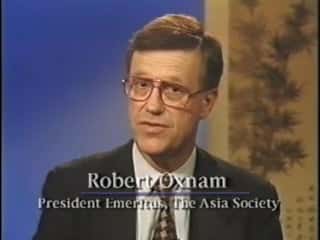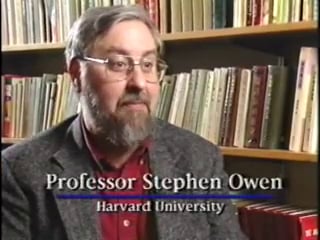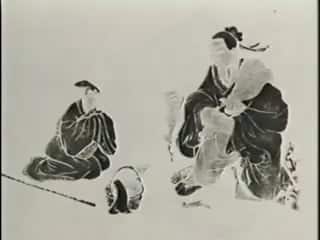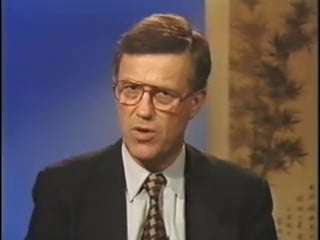Playlist: The Book of Songs: Legends of the Zhou and the Nature of Chinese Society
Introduction
Transcript
Robert Oxnam: The Book of Songs* is also a source of legends about the origins of the Zhou people and the agricultural nature of Chinese society. It describes the birth of the god of millet, known as Houji, the legendary founder of the Zhou clan. Here we see the centrality of agriculture to the people of ancient China and the importance of ritual as a way of maintaining harmony and peace.
* The Book of Songs is also known as the Book of Poetry, the Classic of Poetry, and sometimes the Book of Odes. These are all possible translations of the Chinese title, Shi jing [Shih-ching in Wade-Giles romanization].
Agriculture
Transcript
Stephen Owen: It's a story of how the Zhou people were born from the millet god, and the mother, whose name is Jiang Yuan, probably Jiang, the first parent, does the ritual sacrifices and strangely enough steps in the toe print of the god. And by stepping in the toe print of the god, she becomes pregnant, and the poem goes through all the phases and finally, her son is born, whose name is Lord Millet or Houji.
And Houji invents farming and becomes the ancestor of the Zhou people.
Excerpt from "Foundation of the Zhou," from the Book of Songs... Then in reverence, then in awe
She gave birth, she nurtured
And this was Houji.
Indeed, she had fulfilled her months,
And her first-born came like a lamb
With no bursting or rending,
With no hurt or harm.
To make manifest His magic power
God on high gave her ease.
So blessed were her sacrifice and prayer
That easily she bore her child. ...
He planted large beans;
His beans grew fat and tall.
His paddy-lines were close set,
His hemp and wheat grew thick,
His young gourds teemed.
Truly Houji's husbandry
Followed the way that had been shown.
* The Book of Songs is also known as the Book of Poetry, the Classic of Poetry, and sometimes the Book of Odes. These are all possible translations of the Chinese title, Shi jing [Shih-ching in Wade-Giles romanization].
Ritual
Transcript
Stephen Owen: The last part of the poem is a ritual poem, in which the people talk about the nature of the harvest ritual, preparing the grain, making the sacrifice, and stressing the continuity of the sacrifice; that is, that these procedures, both ritual and farming, are the sort of reproducible forms that are done exactly the same year after year.
Excerpt from "Foundation of the Zhou," from the Book of SongsHouji reaped and acred;
Far and wide the millet pink and white
He carried in his arms, he bore on his back,
Brought them home, and created the sacrifice.
Indeed, what are they, our sacrifices?
We pound the grain, we bake it out,
We sift, we tread,
We wash it, soak, soak;
We boil it all steamy.
Then with due care, due thought
We gather southernwood, make offering of fat,
Take lambs for the rite of expiation,
We roast, we broil,
To give a start to the coming year. ...
Houji founded the sacrifices, And without blemish or flaw
They have gone on till now.
Stephen Owen: Certainly, you know, ritual is very important in Chinese life. Not ritualism in some sort of hollow sense, but ritual in the sense that one can control or manage things. That if you do the right thing, certain results will follow, that the universe is not essentially unpredictable.
* The Book of Songs is also known as the Book of Poetry, the Classic of Poetry, and sometimes the Book of Odes. These are all possible translations of the Chinese title, Shi jing [Shih-ching in Wade-Giles romanization].
Mandate of Heaven
Transcript
Robert Oxnam: Here in the Book of Songs* we also find an early statement of the Chinese notion of the Mandate of Heaven, in another poem that tells how King Wen, the founder of the Zhou dynasty, overthrew the Shang dynasty and its capital city of Yin because its leaders failed to follow Heaven's charge to be upright rulers and to carry out the rituals.
Excerpt from "Mighty is God on High," from the Book of SongsKing Wen said, "Come!
Come, you Yin and Shang!
It is not that God on high did not bless you;
It is that Yin does not follow the old ways.
Even if you have no old men ripe in judgment,
At least you have your statutes and laws.
Why is it that you do not listen, But upset Heaven's great charge?"
Stephen Owen: The earthly ruler misbehaves, and Heaven gets angry and destroys the earthly ruler. The earthly ruler behaves, he is the counterpart of Heaven, is the way the Classic of Poetry* says. So that there is this resonance between the behavior of the high god or maybe perhaps the collective ancestors and the king on earth.
* The Book of Songs is also known as the Book of Poetry, the Classic of Poetry, and sometimes the Book of Odes. These are all possible translations of the Chinese title, Shi jing [Shih-ching in Wade-Giles romanization].
About the Speakers
Robert B. Oxnam
President Emeritus, Asia Society
Stephen Owen
James Bryant Conant University Professor; Professor of Comparative Literature, Harvard University
Paul Rouzer
Associate Professor, Department of Asian Languages and Literatures, University of Minnesota
Marsha Wagner
Adjunct Professor of Chinese Literature, Columbia University
David D. W. Wang
Edward C. Henderson Professor of Chinese Literature, Harvard University
Related Videos
The Book of Songs and China’s Literary Tradition
The Book of Songs: The Han Dynasty Codification
The Book of Songs: “The Great Preface” and Five Notions about Poetry
Individual Voices in the Book of Songs








